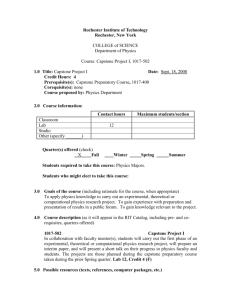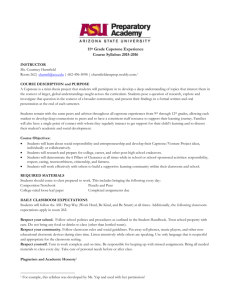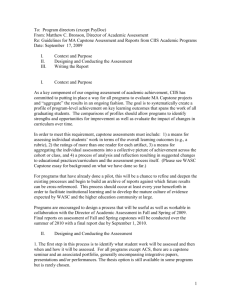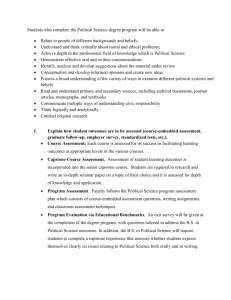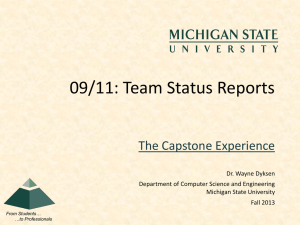Syllabus 10 weeks Face to Face
advertisement
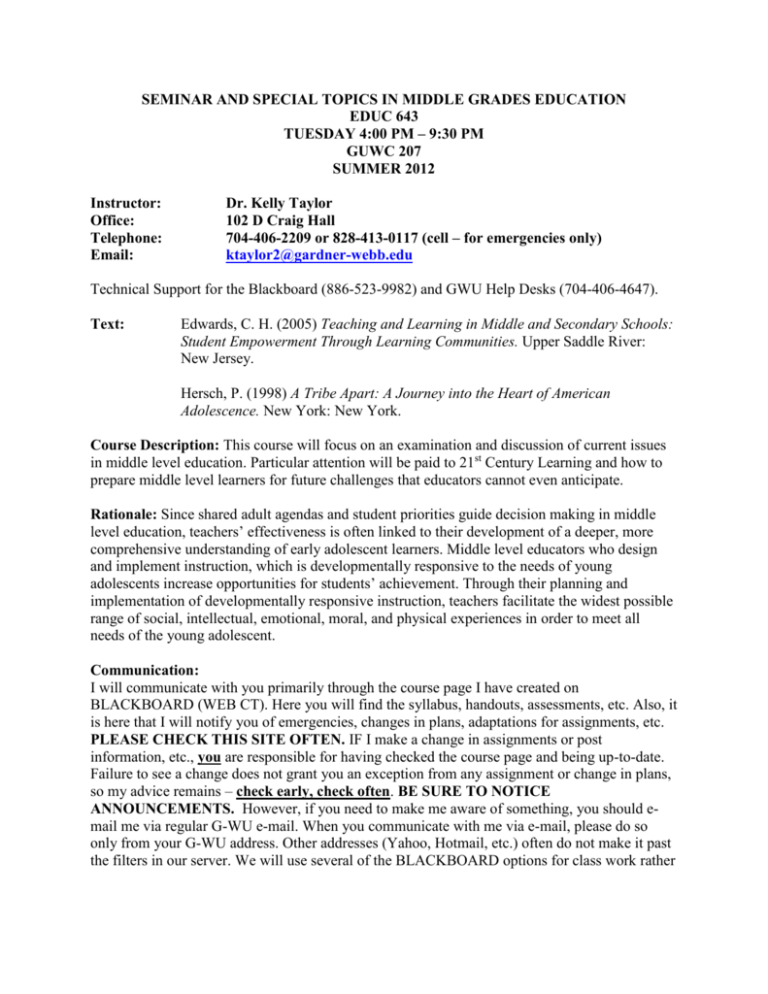
SEMINAR AND SPECIAL TOPICS IN MIDDLE GRADES EDUCATION EDUC 643 TUESDAY 4:00 PM – 9:30 PM GUWC 207 SUMMER 2012 Instructor: Office: Telephone: Email: Dr. Kelly Taylor 102 D Craig Hall 704-406-2209 or 828-413-0117 (cell – for emergencies only) ktaylor2@gardner-webb.edu Technical Support for the Blackboard (886-523-9982) and GWU Help Desks (704-406-4647). Text: Edwards, C. H. (2005) Teaching and Learning in Middle and Secondary Schools: Student Empowerment Through Learning Communities. Upper Saddle River: New Jersey. Hersch, P. (1998) A Tribe Apart: A Journey into the Heart of American Adolescence. New York: New York. Course Description: This course will focus on an examination and discussion of current issues in middle level education. Particular attention will be paid to 21st Century Learning and how to prepare middle level learners for future challenges that educators cannot even anticipate. Rationale: Since shared adult agendas and student priorities guide decision making in middle level education, teachers’ effectiveness is often linked to their development of a deeper, more comprehensive understanding of early adolescent learners. Middle level educators who design and implement instruction, which is developmentally responsive to the needs of young adolescents increase opportunities for students’ achievement. Through their planning and implementation of developmentally responsive instruction, teachers facilitate the widest possible range of social, intellectual, emotional, moral, and physical experiences in order to meet all needs of the young adolescent. Communication: I will communicate with you primarily through the course page I have created on BLACKBOARD (WEB CT). Here you will find the syllabus, handouts, assessments, etc. Also, it is here that I will notify you of emergencies, changes in plans, adaptations for assignments, etc. PLEASE CHECK THIS SITE OFTEN. IF I make a change in assignments or post information, etc., you are responsible for having checked the course page and being up-to-date. Failure to see a change does not grant you an exception from any assignment or change in plans, so my advice remains – check early, check often. BE SURE TO NOTICE ANNOUNCEMENTS. However, if you need to make me aware of something, you should email me via regular G-WU e-mail. When you communicate with me via e-mail, please do so only from your G-WU address. Other addresses (Yahoo, Hotmail, etc.) often do not make it past the filters in our server. We will use several of the BLACKBOARD options for class work rather than hand- outs/paper assignments in class, so make sure that you are familiar with the environment. Participation: Participation in class, individual assignments, and group assignments is mandatory. In order for you to be successful in this class, it is essential that you are prepared and ready to participate at each class meeting. Attendance: Students are expected to be in class. Please remember that Gardner-Webb University maintains a 75% attendance policy. Students should realize that missing a class does not grant an exemption from any work, assignments, readings, etc. It is incumbent upon the student, not the professor, to be responsible for assignments, both those on the syllabus and any made in class. Online attendance will be taken based on participation in weekly online discussions. Accommodations: If your learning or participation in this class might be affected in any way by a disability recognized under the Americans with Disabilities Act (ADA), you will need to do the following: 1. Register with the Noel Program for the Disabled at Gardner Webb University at (704) 406-4270 2. Educate me about your disability so that I can work with you and the Noel Program to arrange necessary accommodations. It is important that you take both of these steps no later than the first week of the semester. Course Objectives: Through the successful performance of the activities in this course, the student will be able to: 1. Understand and apply current middle level research in the classroom. 2. Create responsive middle school environments based on the personhood of the adolescent. 3. Articulate and implement curriculum theories, research, and exemplary practices concerning various topics of controversy facing middle level educators. 4. Articulate and implement various support structures for middle school students in their academic, intellectual, and emotional growth. 5. Exhibit high expectations for students and express dialogue that is mature, sensitive, and discreet when counseling middle level students. 6. Work in and create strong team relationships including a working relationship with colleagues, students, and parents. Learning Tasks/Activities/Learner Responsibilities: 1. Read A Tribe Apart and respond to online discussion questions weekly. (scored with Discussion Rubric) 2. Participate in one on-line reading group and complete all activities within the group. See the Online Book Group page at the end of the syllabus for instructions and book choices. (scored with Discussion Rubric) 3. Choose two of the following topics and prepare a one-hour presentation/discussion/activity for the class. You may complete this assignment in pairs or small groups. Check the tentative schedule for dates for each topic. Topics are as follows (or if you have another topic you would like to discuss, we can talk about it): (scored with Presentation Rubric) a. Merit Pay b. Teacher Evaluation c. Grouping d. Gender-based Education e. Web 2.0 Tools f. Bullying 4. Choose three chapters from Teaching and Learning in Middle and Secondary Schools and prepare a one-hour presentation/discussion/activity for the class. You may complete this assignment individually or in pairs. Check the tentative schedule for dates for each chapter. (scored with Presentation Rubric) 5. Complete a 20-minute presentation of the first three chapters of your capstone. You may not use power point, but you must use some type of multi-media. (scored with Presentation Rubric) 6. Capstone Journal Reflections: Students are expected to keep a journal of their capstone process that reflects each of the NC Professional Teaching Standards. Students will be required to post five of these journals throughout the course. Due dates will be indicated in the syllabus. Classmates are to post responses as outlined in the Discussion Rubric. (scored as Pass/Fail for capstone seminar) 7. Capstone Paper: Students must finalize drafts of Chapters 1-3 of the capstone and make sure their IRB is complete. (scored as Pass/Fail for capstone seminar) Grades: The grading scale will be as follows: A 95-100 = Excellent Work A90-94 = Exceeds Expectations B+ 85-89 = Good Solid Work B 80-84 = Meets Expectations B76-79 = Does Not Fully Meet Expectations C 75-79 = Not Graduate Quality Work F 74 and below = Unacceptable Work Tentative Course Calendar: Subject to change at instructor’s discretion. (TLMSS is Teaching and Learning in Middle and Secondary Schools; ATA is A Tribe Apart) Date Week 1 Week 2 Week 3 Week 4 Week 5 Week 6 Topic Introduction/Welcome; Learning Communities (Chapter 1, TLMSS); Technology in Schools Ch. Presentation: Student Differences and Needs; Autonomy and Student Empowerment Topic Presentation: Gender-Based Education Ch. Presentations: How Students Learn; Multicultural Education and Exceptionality in Learning Communities Technology Presentation by Guest Speakers Ch. Presentation: Teaching as Reflection and Decision-Making; Instructional Planning in Learning Communities Topic Presentation: Grouping Ch. Presentation: Intellectual Development and Social Growth; Motivation in Learning Communities Topic Presentation: Bullying Ch. Presentations: Discipline in Learning Communities; Measuring and Evaluating Learning and Schooling Topic Presentation: Teacher Evaluation Week 7 Online Day – Work on Capstone Presentations Week 8 Ch. Presentations: Teacher Improvement Topic Presentation: Merit Pay Capstone Presentations (20 mins. per person) Ch. Presentation: Working with Parents and Community Topic Presentation: Web 2.0 Tools Capstone Presentations (20 mins. per person) Book Group presentations Week 9 Week 10 Assignment Due (In-class/Online) Purchase texts, Presentation selections TLMSS Chs. 1, 2, and 3 ATA Prologue- Ch. 1 Capstone Journal 1 due TLMSS Chs. 4 and 5 ATA Ch. 2-4 Capstone draft chs.1-3 due TLMSS Chs. 6 and 7 ATA Ch. 5-7 Capstone Journal 2 due TLMSS Chs. 8 and 9 ATA Ch. 8-11 TLMSS Chs. 10 and 11 ATA Ch. 12-14 Capstone Journal 3 due ATA Ch. 15-18 Capstone drafts chs. 1-3 due online TLMSS Ch. 12 ATA Ch. 19-20 Capstone Journal 4 due TLMSS Ch. 13 ATA Ch. 21-Epilogue All on-line work should be finished by 7/27, including Capstone Journal 5 Online Book Groups More than one cohort group will be participating. Choose one book to read and participate in an online discussion via GoodReads.com. You will need to create an account, but it’s free. When you have chosen, email me at ktaylor2@gardnerwebb.edu and tell me which book you have chosen. I will then invite you to join the group. Your group will create a presentation for your class. The presentation will be completely online; so all members of the group will participate. I will then post these presentations in each class so that you will be able to view and comment on all of them. The presentation should be 15-20 minutes long and should include an overview of the book and implications for the classroom. The presentations will be graded with the presentation rubric. Book Choices: 1. Teaching 2030: What We Must Do for Our Students and Our Public Schools…Now and in the Future by Barnett Berry Description: Click on the link below for a review. http://educationvisionleadership.edublogs.org/2011/08/11/teaching-2030-what-we-mustdo-for-our-students-and-our-public-schools-now-and-in-the-future/ 2. A New Culture of Learning: Cultivating: Cultivating the Imagination for a World of Constant Change by Douglas Thomas and John Seely Brown Description: Click on the link below for a review. http://www.newcultureoflearning.com/ 3. Rethinking Education in the Age of Technology: The Digital Revolution and Schooling in America by Allan Collins and Richard Halverson Description: Click on the link below for a review. http://elearnmag.acm.org/featured.cfm?aid=1656386 ATA Discussions: Prologue-Chapter 1: This book came about through honest conversation with teenagers. What are your thoughts about conversing at the level with your students? Have you ever approached this level of conversation? If so, did you learn from it? Are there concerns about this? Chapter 2-4: What are your thoughts about how the school dealt with the "political speech" incident in Mrs. Nance's class? How would you have handled it? Chapters 5-7: What are your thoughts about the kids' take on the ethics of cheating? Do you still see this as an issue in classrooms? Chapters 8-11: Is peer pressure the most important thing in the lives of our students? If so, how can we help to influence our students? Is that our job, as educators? Chapters 12-14: What is the most surprising/shocking thing you have read so far? What is the most interesting? Why? Chapters 15-18: How often do you recognize those kids, who, like Chris, can be respectful and turn in completed work and just be skating by(and bored)? What do/would you do about those students? Chapters 19-20: What are your thoughts on homework? Consider Ann, for whom homework has come to represent all that is wrong in her life with her family, and therefore does not do it for emotional reasons, but is otherwise a good student. Chapters 21-Epilogue: Did you like this book? Did it give you some new insights into the adolescent mind? Would you recommend keeping it in this course?

